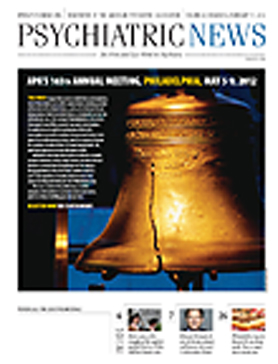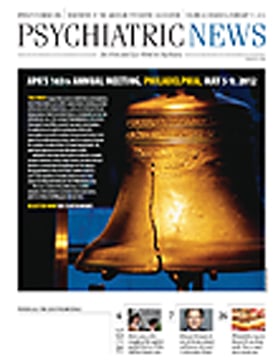The 56th annual meeting of the American Academy of Psychoanalysis and Dynamic Psychiatry (AAPDP) will be held May 3 to 5 in conjunction with APA’s 2012 annual meeting in Philadelphia.
The AAPDP invites all psychiatrists who are interested in psychodynamic psychiatry to learn about and to discuss the important role of psychodynamics in the practice of psychiatry. Its principal goal is to maintain psychotherapy as a fundamental part of the psychiatric profession, always taking into account a biopsychosocial, medical, and humanistic perspective. Residents and medical students can attend the meeting free.
In what have already become a tradition and a statement about AAPDP’s strong ties with APA, the opening speaker will be APA President John Oldham, M.D., who will discuss “Personality Disorders and DSM-5. ” Thanks to the efforts of co-chairs Eugene Della Badia, D.O., and Kimberly Best, M.D., the meeting includes a plenary session with Henri Parens M.D., a child survivor of the Holocaust who will present autobiographical material and discuss resiliency. The keynote address will be delivered by Salman Akhtar, M.D., who will present “Psychoanalytic Perspectives on Human Goodness: Theory and Technique.”
The varied program addresses the use of psychodynamic psychiatry in diverse settings and populations, including such symposia as “Psychotherapy Approaches With Children and Families of Underprivileged and Culturally Diverse Backgrounds” and “The Interface Between Psychodynamics and Biologic Psychiatry.” The latter focuses on such important issues as the role of psychotherapy in improving adherence to pharmacological treatments. From the humanistic perspective, “New Frontiers in Psychodynamic Psychiatry” offers a diverse collection of presentations on applied psychodynamics, politics, neuroscience, anthropology, and the arts.
Other presentations include the thought-provoking workshop “The Psychiatrist as Internist of the Mind.” There are also open discussion groups addressing theoretical models of psychotherapy, in which attendees are welcome to share their experiences and opinions with colleagues. The program also offers lectures, mentoring for residents and medical students, and a luncheon for psychiatry residents, featuring the presentation “The Nocebo Effect: Reviewing the Literature From a Medical Student’s Perspective.”
Please come and join us in Philadelphia so you can enjoy this series of stimulating presentations by some of the top professionals in the field.

